Welcome to the nutritional vitamin d content in 7 different types of flaxseed, ranging from 75.00 IU to 0.00 IU per 100g. The basic type of flaxseed is Seeds, flaxseed, where the amount of vitamin d in 100g is 0.00 IU. 0.00 IU of vitamin d per 100g, from Seeds, flaxseed corresponds to % of the vitamin d RDA. For a typical serving size of 1.000 tbsp, whole (or 10.30 g) the amount of Vitamin D is 0 IU. This corresponds to an RDA percentage of %.
The percentage of the recommended daily allowance (RDA) for vitamin d is based on a 400 IU RDA level for a mature adult.
Top five flaxseed products high in vitamin d
Below is a summary list for the top five flaxseed items ranked by the amount or level of vitamin d in 100g.
1. Cereals ready-to-eat, KELLOGG RAISIN BRAN with Omega-3 from flaxseed : 75.00IU
2. Cereals ready-to-eat, KASHI GO LEAN CRUNCH!, Honey Almond Flax : 0.00IU
3. Cereals ready-to-eat, NATURE'S PATH, Organic FLAX PLUS, Pumpkin Granola : 0.00IU
4. Cereals ready-to-eat, NATURE'S PATH, Organic FLAX PLUS flakes : 0.00IU
5. Seeds, flaxseed : 0.00IU
Following on from the five top flaxseed items or products containing vitamin d we have a more comprehensive break down of Seeds, flaxseed, and the highest item containing vitamin d which is Cereals ready-to-eat, KELLOGG RAISIN BRAN with Omega-3 from flaxseed. We also give a comparison of average values, median values and lowest values along with a comparison with other food groups and assess the effects of storage and preparation on the 7 types of flaxseed.
At the bottom of the page is the full list for the 7 different types of flaxseed based on the content in different servings in grams and oz (and other serving sizes), providing a comprehensive analysis of the vitamin d content in flaxseed.
Seeds, flaxseed - Nutritional Content and Chart
The full nutrition content, RDA percentages and levels for Seeds, flaxseed should be considered along with the vitamin d content. This food profile is part of our list of food and drinks under the general group Nut and Seed Products.Other important and vitamin d related nutrients are Energy, Protein, Total Fat and Carbohydrate. For this 100g serving in your diet, the amount of Energy is 534.00 kcal (27% RDA), the amount of Protein is 18.29 g (33% RDA), the amount of Total Fat is 42.16 g (65% RDA) and the amount of Carbohydrate is 28.88 g (22% RDA). The nutritional content and facts for 100g, which includes Energy, Protein, Total Fat and Carbohydrate is shown in the RDA chart below as percentages of the recommended daily allowance along with the vitamin d levels in flaxseed.
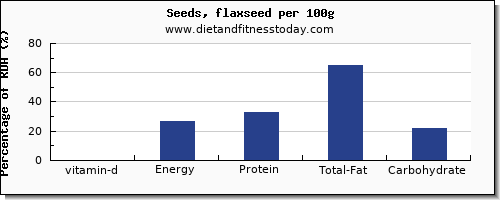
Our proprietary nutritional density score gives a nutritional value out of 100 based on 9 different vitamins, minerals and macro nutrients. Seeds, flaxseed has a nutritional value score of 16.00 out of 100.
Amount of vitamin d per 100 Calories
100 calories of seeds, flaxseed is a serving size of 0 g, and the amount of Vitamin D is 0 IU. Other important and related nutrients and macronutrients such as Total Fat, in 100 Calories are as follows; Energy 0 kcal (0% RDA), Protein 0 g (0% RDA), Total Fat 0 g (0% RDA), Carbohydrate 0 g (0% RDA). This is shown in the vitamin d RDA percentage chart below, based on 100 Calories, along with the other important nutrients and macro nutrients.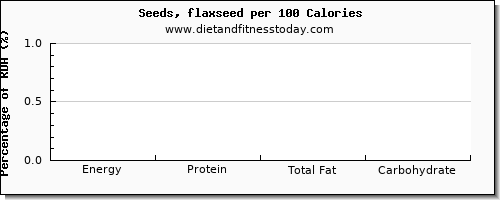
Content per Typical Serving Size 1.000 tbsp, whole (or 10.30 g)
For the food Seeds, flaxseed the typical serving size is 1.000 tbsp, whole (or 10.30 g) which contains 0 IU of Vitamin D. In terms of the gram weight and total content for this serving the Energy content is 55 kcal, the Protein content is 1.88 g, the Total Fat content is 4.34 g and the Carbohydrate content is 2.97 g. The percentages are shown below in the vitamin d chart, for the typical serving of vitamin d and the related and important nutritional values.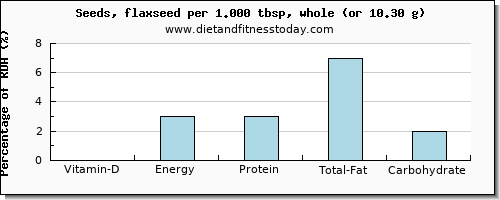
Macronutrients in Seeds, flaxseed
The amount of protein, fat and carbs from this food described above is measured in grams per 100g and grams in a typical serving size (in this case 1.000 tbsp, whole or 10.30 g), although it is also useful to give the number of calories from protein, fat and carbohydrate which are the most important macronutrients. For this serving in your diet here are the macronutrient calories. From protein the number of calories is 6.5 (kcal).The total calories from carbohydrate is 12.1 (kcal).
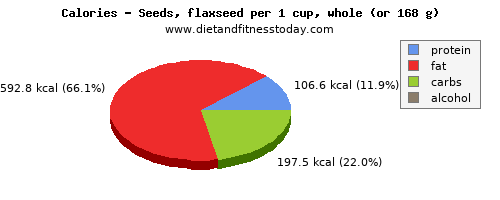
IU of vitamin d in flaxseed (per 100g)
This list of 7 types of flaxseed, is brought to you by www.dietandfitnesstoday.com and ranges from Cereals ready-to-eat, KELLOGG RAISIN BRAN with Omega-3 from flaxseed through to Oil, flaxseed, cold pressed where all food items are ranked by the content or amount per 100g. The nutritional vitamin d content can be scaled by the amount in grams, oz or typical serving sizes. Simply click on a food item or beverage from the list at the bottom of the page to give a full dietary nutritional breakdown to answer the question how much vitamin d in flaxseed.
The list below gives the total vitamin d content in the 7 items from the general description 'flaxseed' each of which show the vitamin d amount as well as Energy, Protein, Total Fat and Carbohydrate. Below, is the top 7 food items shown in the vitamin d chart. This gives a quick and easy dietary comparison for the different items, where each item is listed at the bottom of the page with a nutritional summary.
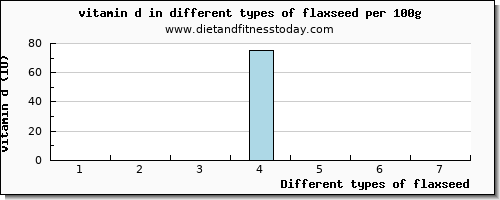
The corresponding nutritional value for flaxseed based on our density score out of 100 (ranked by the amount of vitamin d per 100g) is shown in the below nutritional density chart. 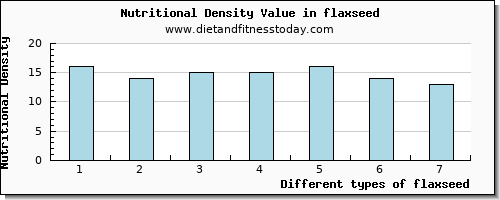
The corresponding Calories for flaxseed ranked by the amount of vitamin d per 100g is shown below in the flaxseed calories chart. 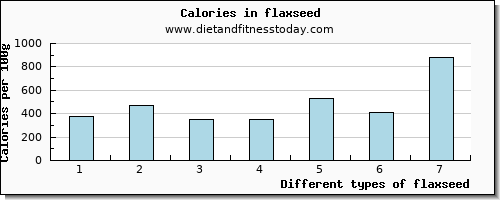
Average Content for flaxseed
The average (or more correctly the arithmetic mean) amount of vitamin d contained in 100g of flaxseed, based on the list below of 7 different items under the general description of flaxseed, is 10.71 IU of vitamin d. The averages for the different nutrients are as follows; the average amount of Energy is 482.43 kcal, the average amount of Protein is 10.48 g, the average amount of Total Fat is 27.65 g and the average amount of Carbohydrate is g.Median Amount
The median value of Vitamin D is found in Cereals ready-to-eat, NATURE'S PATH, Organic FLAX PLUS flakes which in 100g contains 0.00 IU of Vitamin D. For this serving the amount of Energy is 350.00 kcal, the amount of Protein is 11.91 g, the amount of Total Fat is 5.46 g and the amount of Carbohydrate is 75.27 g.Highest vitamin d Content per 100g
Using the list below for the 7 different flaxseed nutrition entries in our database, the highest amount of vitamin d is found in Cereals ready-to-eat, KELLOGG RAISIN BRAN with Omega-3 from flaxseed which contains 75.00 IU of vitamin d per 100g. The associated percentage of RDA is %. For this 100g serving the Energy content is 349.00 kcal, the Protein content is 7.30 g, the Total Fat content is 2.50 g, the Carbohydrate content is 82.69 g. 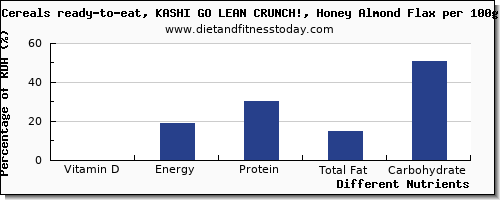
The lowest amount of vitamin d in 100g is in Oil, flaxseed, cold pressed which contains 0.00 IU. This gives as percentage of the recommended daily allowance % of the RDA. For this 100g serving the amount of Energy is 884.00 kcal, the amount of Protein is 0.11 g, the amount of Total Fat is 99.98 g, the amount of Carbohydrate is 0.00 g.
The difference between the highest and lowest values gives a vitamin d range of 75 IU per 100g. The range for the other nutrients are as follows; 535 kcal for Energy, 7.19 g for Protein, 97.48 g for Total Fat, 0 g for Carbohydrate.
Highest Amount of vitamin d per Serving
Please remember that the above gives an accurate value in 100g for high vitamin d foods in your diet. For example 100g of Seeds, flaxseed contains 0.00 IU of vitamin d. However, there are other factors to consider when you are assessing your nutritional requirements. You should also take into account portion sizes when you are considering the vitamin d nutritional content.
The food with the highest vitamin d content per typical serving is Cereals ready-to-eat, KELLOGG RAISIN BRAN with Omega-3 from flaxseed which contains 39.75 IU in 1.000 Cup (1 NLEA serving) (or 53.00 g). For this serving the Energy content is 184.97 kcal, the Protein content is 3.87 g, the Total Fat content is 1.33 g and the Carbohydrate content is 43.83 g.
Nutritional Information Summary
From the list below you can find a full nutrition facts breakdown for all foods containing vitamin d which can be scaled for different servings and quantities. We have also sorted our complete nutritional information and vitamin database of over 7000 foods, to give a list of vitamin d rich foods.
| |||||||||||||||||||||||||||||||||||||||||||||||||||||||||||||||||||||||||||||||||||||||||||||||||||||||||||||||||||||||||||||||||||||||||||||||||||||||||||||||||||||||||||||||||||||||||||||||||||||||||||||||||||||||||||||||||||||||||||||||||||||||||||||||||||||||||||||||||||||||||||||||||||||||||||||||||||||||||||||||||||||||||||||||||||||||||||||||||